三年级作文:学英语遇到的困难
英语学习的困难的英语作文
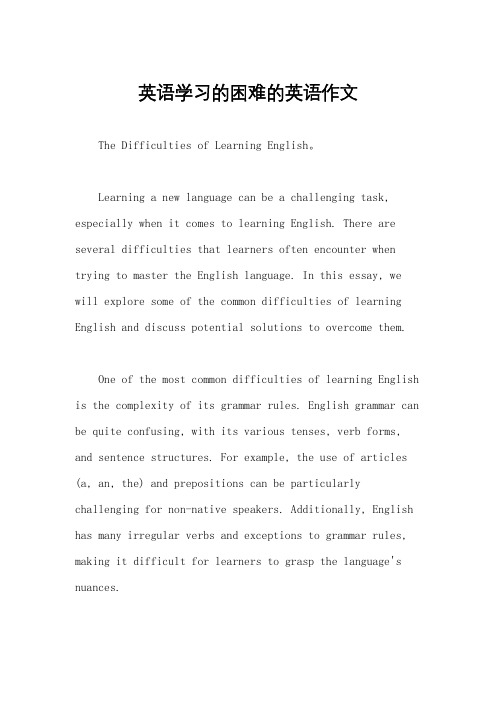
英语学习的困难的英语作文The Difficulties of Learning English。
Learning a new language can be a challenging task, especially when it comes to learning English. There are several difficulties that learners often encounter when trying to master the English language. In this essay, we will explore some of the common difficulties of learning English and discuss potential solutions to overcome them.One of the most common difficulties of learning English is the complexity of its grammar rules. English grammar can be quite confusing, with its various tenses, verb forms, and sentence structures. For example, the use of articles (a, an, the) and prepositions can be particularly challenging for non-native speakers. Additionally, English has many irregular verbs and exceptions to grammar rules, making it difficult for learners to grasp the language's nuances.Another difficulty of learning English is its extensive vocabulary. English has a vast number of words, and many words have multiple meanings and uses. This can be overwhelming for learners, especially when trying to remember and use new vocabulary in context. Furthermore, English pronunciation can be tricky, as words are not always pronounced as they are spelled, and there are various regional accents and dialects to contend with.In addition to grammar, vocabulary, and pronunciation, cultural differences can also pose a challenge for English learners. English is spoken in many different countries and cultures, each with its own idioms, slang, and expressions. Understanding and using these cultural nuances can be difficult for non-native speakers, as it requires an understanding of the cultural context in which the language is used.So, how can learners overcome these difficulties and improve their English skills? One approach is to engage in regular and consistent practice. This can include reading English books, watching English-language movies and TVshows, and listening to English music and podcasts. Immersing oneself in the language and exposing oneself to different accents and dialects can help improve listening and comprehension skills.Another effective strategy is to find a language exchange partner or join a language learning community. This can provide opportunities to practice speaking and writing in English with native speakers or other learners. Feedback from others can be valuable in identifying and correcting mistakes, as well as improving fluency and confidence in using the language.Additionally, using technology and online resources can be beneficial for English learners. There are numerous language learning apps, websites, and online courses that offer interactive lessons, exercises, and quizzes to help improve grammar, vocabulary, and pronunciation. These resources can be accessed anytime and anywhere, making it convenient for learners to practice and improve their English skills.In conclusion, learning English can be challenging dueto its complex grammar, extensive vocabulary, pronunciation, and cultural differences. However, with dedication, practice, and the right resources, these difficulties canbe overcome. By immersing oneself in the language, seeking opportunities to practice, and utilizing technology and online resources, learners can improve their English skills and become more proficient in the language. With perseverance and determination, mastering English is achievable for anyone willing to put in the effort.。
学习英语的困难作文带翻译
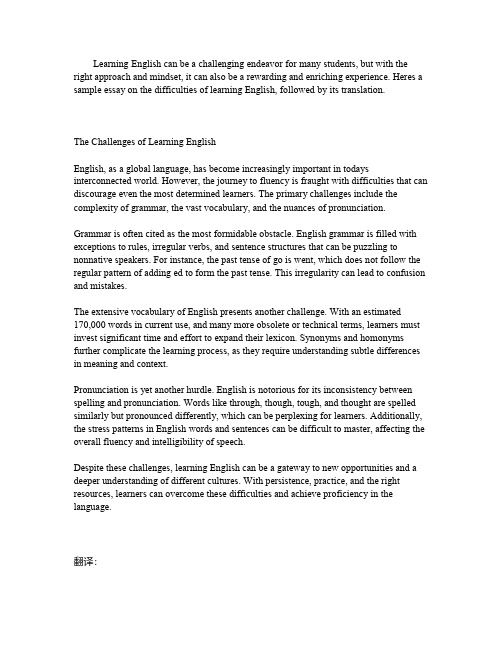
Learning English can be a challenging endeavor for many students, but with the right approach and mindset, it can also be a rewarding and enriching experience. Heres a sample essay on the difficulties of learning English, followed by its translation.The Challenges of Learning EnglishEnglish, as a global language, has become increasingly important in todays interconnected world. However, the journey to fluency is fraught with difficulties that can discourage even the most determined learners. The primary challenges include the complexity of grammar, the vast vocabulary, and the nuances of pronunciation.Grammar is often cited as the most formidable obstacle. English grammar is filled with exceptions to rules, irregular verbs, and sentence structures that can be puzzling to nonnative speakers. For instance, the past tense of go is went, which does not follow the regular pattern of adding ed to form the past tense. This irregularity can lead to confusion and mistakes.The extensive vocabulary of English presents another challenge. With an estimated 170,000 words in current use, and many more obsolete or technical terms, learners must invest significant time and effort to expand their lexicon. Synonyms and homonyms further complicate the learning process, as they require understanding subtle differences in meaning and context.Pronunciation is yet another hurdle. English is notorious for its inconsistency between spelling and pronunciation. Words like through, though, tough, and thought are spelled similarly but pronounced differently, which can be perplexing for learners. Additionally, the stress patterns in English words and sentences can be difficult to master, affecting the overall fluency and intelligibility of speech.Despite these challenges, learning English can be a gateway to new opportunities and a deeper understanding of different cultures. With persistence, practice, and the right resources, learners can overcome these difficulties and achieve proficiency in the language.翻译:学习英语的困难英语作为全球语言,在当今互联的世界中变得越来越重要。
学英语遇到的困难和解决办法英语作文60字

学英语遇到的困难和解决办法英语作文60字全文共6篇示例,供读者参考篇1Learning English: Challenges and SolutionsHi there! My name is Emily, and I'm a 10-year-old student in the fifth grade. Like many other kids my age, I've been learning English since I was in preschool. It's a really cool language, and I love how it sounds and how different it is from my native language. However, learning English hasn't always been easy for me. There have been times when I've felt frustrated, confused, and even a little discouraged. But over the years, I've learned some tricks and strategies that have helped me overcome those challenges. Let me share my experiences with you!One of the biggest difficulties I faced when I first started learning English was pronunciation. I remember feeling soself-conscious about saying words correctly, especially those tricky ones with strange letter combinations or silent letters. It was really hard for me to figure out how to pronounce words like "through," "enough," or "tough." I would practice and practice, but I still felt like I was messing up all the time.My teacher noticed that I was struggling and suggested that I try listening to English songs, watching movies or TV shows in English, and repeating words and phrases out loud. At first, I felt a little silly doing this, but it really did help! By hearing native English speakers and imitating their pronunciation, I slowly started to get the hang of it. I also learned some silly little rhymes and mnemonics to help me remember how to pronounce certain words. For example, "the tough cough ploughed through the rough drought" helped me with the "ough" sound.Another big challenge for me was learning all the grammar rules in English. In my native language, the grammar is quite different, and it was really confusing to wrap my head around things like subject-verb agreement, verb tenses, and word order.I would get so frustrated when my teacher would correct me, and I would think, "But that's how we say it in my language!"My mom helped me out a lot with this one. She bought me some fun grammar workbooks and flashcards, and we would practice together every night. She also encouraged me to read a lot of beginner-level English books and stories, so I could see how the grammar rules were applied in context. Slowly but surely, it started to click, and I got better at using the correct grammar without even thinking about it too much.One of the most frustrating things about learning English, though, was feeling like I couldn't express myself fully. In my native language, I could communicate my thoughts and feelings so easily, but in English, I often struggled to find the right words or phrases. It was like my personality was getting lost in translation.To help with this, my teacher suggested that I start keeping a journal or diary in English. At first, it felt really awkward and forced, but as I kept writing, I found that I was able to express myself more and more freely. I would write about my day, my feelings, my hopes and dreams, and anything else that came to mind. It was like a safe space for me to practice using English without worrying about making mistakes or being judged.Another strategy that helped me was to actively learn new vocabulary words and idioms. I would make flashcards or use apps to study new words and expressions, and then I would try to use them in conversation or in my writing. It was like adding more colors to my English "palette," which allowed me to paint a more vivid and accurate picture of my thoughts and emotions.Speaking of conversation, that was another big hurdle for me. I was always so nervous about speaking English in front of others, especially native speakers. I was afraid of makingmistakes or not being understood, and I would often clam up or give really short, simple answers.My parents enrolled me in an English conversation club, where I could practice speaking with other kids who were also learning the language. At first, it was really uncomfortable, but over time, I started to feel more confident and relaxed. We would play games, do role-playing activities, and just chat about our interests and hobbies. It was a safe, supportive environment where we could make mistakes without feeling embarrassed or judged.Additionally, my teacher encouraged me to find a pen pal or language partner to practice conversing with. I ended up connecting with a girl my age in an English-speaking country, and we would have weekly video calls where we would just talk about our lives, our interests, and whatever else came to mind. It was a lot of fun, and it really helped me improve my speaking and listening skills in a natural, low-pressure way.I also try to focus on the positive aspects of learning English – like being able to communicate with people from all over the world, understanding English movies and books without needing translations, and having an advantage when it comes to future job opportunities or travel.Most importantly, I've learned that it's okay to make mistakes. In fact, mistakes are a natural and essential part of the learning process. Instead of getting frustrated or embarrassed, I try to view each mistake as an opportunity to learn and improve.So, if you're learning English too and feeling a bit overwhelmed or discouraged, don't give up! It's a challenging journey, but it's also an incredibly rewarding one. Keep practicing, keep trying new strategies, and most importantly, be patient and kind to yourself. You've got this!篇2Learning English: Challenges and SolutionsHi there! I'm an elementary school student, and I've been learning English for a few years now. It's been a fun but challenging journey, and I want to share with you some of the difficulties I've faced and the solutions that have helped me overcome them.One of the biggest challenges I encountered was understanding and pronouncing English words correctly. English has so many weird spellings and pronunciations that don't follow the same rules as my native language. For example, words like"ough" can be pronounced differently in words like "though," "through," and "cough." It's confusing, right?To tackle this problem, I started practicing pronunciation by listening to audio books and watching English cartoons. I would pause and repeat words and phrases until I got them right. My teacher also introduced me to tongue twisters, which are fun phrases that are challenging to say quickly. Practicing tongue twisters helped me improve my pronunciation and enjoy learning English in a playful way.Another difficulty I faced was remembering all the new vocabulary words. English has so many words, and it seemed like I was learning a bunch of new ones every day. I would often forget words I had just learned, and it was frustrating.To solve this problem, I started creating flashcards with the new words, their meanings, and example sentences. I would review the flashcards regularly and try to use the new words in conversations with my friends and family. I also made word associations, like connecting the word "elephant" with the image of a big animal with a long trunk. These memory tricks helped me remember new vocabulary more effectively.Grammar was another significant challenge for me. English has so many rules for verb tenses, subject-verb agreement, andsentence structure. It was hard to keep track of all the rules and apply them correctly when speaking or writing.To improve my grammar skills, I started doing grammar exercises in workbooks and online quizzes. I also paid close attention to how native English speakers constructed their sentences when watching movies or TV shows. Whenever I made a mistake, I would note down the correct way to say or write it, and practice that specific grammar rule until I got it right.Speaking of movies and TV shows, understanding native English speakers was another obstacle I had to overcome. They often spoke quickly, used idioms and slang, and had different accents and intonations that I wasn't familiar with.To improve my listening comprehension, I watched English shows and movies with subtitles in my native language first, and then gradually transitioned to English subtitles. I also joined an English conversation club at school, where I could practice speaking and listening to other learners and native speakers. The more I exposed myself to authentic English conversations, the easier it became to understand different accents and expressions.Despite these challenges, I never gave up on learning English because I knew how important and rewarding it would be.English has opened up a whole new world of books, movies, music, and opportunities for me to connect with people from different cultures.One of the most effective solutions that helped me overcome these difficulties was developing a positive mindset and staying motivated. I celebrated my small victories, like correctly using a new grammar rule or understanding a joke in English. I also surrounded myself with supportive friends and family who encouraged me to keep practicing and believed in my ability to learn English proficiently.Another crucial solution was finding ways to make learning English fun and engaging. I played word games, sang along to English songs, and read books and comics that I genuinely enjoyed. By incorporating English into my hobbies and interests, learning became less of a chore and more of an enjoyable experience.I also discovered the power of immersion. Whenever possible, I tried to surround myself with English by listening to English music, watching English shows, and reading English books and websites. This consistent exposure to the language helped me develop a better understanding and feel for it.Finally, I learned the importance of seeking help and feedback. Whenever I was stuck or had a question, I didn't hesitate to ask my teacher, parents, or classmates for clarification or guidance. I also asked for feedback on my writing and speaking, which helped me identify my strengths and areas for improvement.Learning English has been a journey filled with challenges, but also with rewarding moments of growth and achievement. By using effective strategies, maintaining a positive attitude, and seeking help when needed, I've been able to overcome many of the difficulties and continue progressing in my English language skills.Remember, learning a new language is a lifelong process, and there will always be new challenges to overcome. But with dedication, perseverance, and the right mindset, you can conquer those challenges and unlock the incredible benefits of being bilingual or multilingual.So, keep practicing, keep learning, and keep believing in yourself. The world of English is vast and exciting, and with every step you take, you'll discover new opportunities and experiences that will enrich your life in countless ways.篇3Learning to Speak English: A Journey Full of Challenges and VictoriesHi there! My name is Emma, and I'm a 10-year-old girl from a small town in China. Like many of my classmates, I've been learning English since I was in kindergarten. It's been quite a ride, let me tell you! Learning a new language is no easy feat, but with determination and the right strategies, it's totally possible to become an English pro.When I first started learning English, everything seemed so strange and confusing. The alphabet looked like a bunch of squiggly lines, and the words sounded nothing like the ones I was used to hearing in Chinese. I remember feeling frustrated and wanting to give up sometimes. But my parents and teachers always encouraged me to keep trying, reminding me that learning a new language takes time and patience.One of the biggest challenges I faced was pronunciation. English has so many different sounds that don't exist in Chinese, like the "th" sound in words like "the" and "think." I used to mix up words like "ship" and "sheep," or "van" and "fan." It was really tricky! My tongue just didn't want to cooperate sometimes.Another hurdle was remembering all the grammar rules. In Chinese, we don't have to worry about things like plurals, verb conjugations, or word order as much. But in English, you have to get all of that right, or your sentences won't make sense. I spent hours practicing sentence structures and memorizing verb tenses. Sometimes, my head felt like it was going to explode!However, as time passed, I started to develop some strategies that really helped me overcome these challenges. One of the most effective techniques was listening to English songs, watching movies, and reading books. Immersing myself in the language helped me get used to the sounds, rhythms, and patterns of English. It was like my brain was slowly rewiring itself to think in English.I also found it helpful to practice speaking out loud as much as possible. Whether it was reading a passage from my textbook or having simple conversations with my English teacher, the more I spoke, the more comfortable I became with the language. It was like exercising a muscle – the more I used it, the stronger it got.One memory that always makes me smile is when I finally nailed the "th" sound. I remember practicing the word "mother" over and over again until I got it right. When I finally said itcorrectly, my teacher gave me a big high-five, and I felt like I was on top of the world!Now, after years of hard work and dedication, I can confidently say that I'm quite fluent in English. I can read, write, and speak the language with relative ease, and I even enjoy watching English movies and TV shows without subtitles. It's a skill that has opened up so many doors for me, both academically and culturally.So, if you're also learning English and feeling discouraged, don't give up! Embrace the challenges, find strategies that work for you, and most importantly, have fun with it. Learning a new language is like unlocking a secret code that allows you to communicate with people from all over the world. It's an incredible superpower, and the rewards are truly endless.Who knows, maybe one day I'll be able to travel the world and use my English skills to make new friends and have amazing adventures. The possibilities are endless, and it all started with those first few wobbly steps into the world of the English language. Keep going, my friends, and never stop exploring the wonders of words!篇4当我开始学英语的时候,我遇到了一些困难。
学习英语碰到的困难英语作文
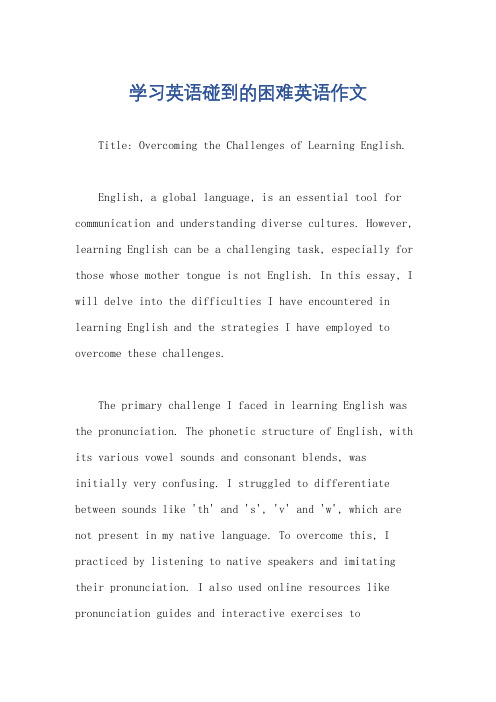
学习英语碰到的困难英语作文Title: Overcoming the Challenges of Learning English.English, a global language, is an essential tool for communication and understanding diverse cultures. However, learning English can be a challenging task, especially for those whose mother tongue is not English. In this essay, I will delve into the difficulties I have encountered in learning English and the strategies I have employed to overcome these challenges.The primary challenge I faced in learning English was the pronunciation. The phonetic structure of English, with its various vowel sounds and consonant blends, wasinitially very confusing. I struggled to differentiate between sounds like 'th' and 's', 'v' and 'w', which are not present in my native language. To overcome this, I practiced by listening to native speakers and imitating their pronunciation. I also used online resources like pronunciation guides and interactive exercises tofamiliarize myself with the sounds of English.Another significant hurdle was the vocabulary. The vast array of words and their numerous meanings often left me scratching my head. I found it difficult to remember the correct usage of words, especially in different contexts. To address this, I created flashcards with definitions and examples, reviewed them regularly, and attempted to use new vocabulary in my daily conversations and writing. I also read extensively, which not only expanded my vocabulary but also helped me understand the nuances of word usage.Grammar was another challenging aspect of English learning. The complex rules and exceptions often left me feeling overwhelmed. I found it difficult to apply the correct grammar rules in speaking and writing, especially when it came to tenses, prepositions, and sentence structure. To simplify this, I referred to reliable grammar guides and worked through practice exercises. I also joined an English speaking group where I could practice my grammar skills in a real-time conversational setting. Gradually, with regular practice, I became more confident in mygrammatical abilities.Cultural differences also posed a challenge in learning English. Understanding the nuances of English-speaking cultures and their impact on language usage was essential for effective communication. I had to learn about different customs, traditions, and social norms to avoid misunderstandings and communicate effectively. I achieved this by engaging with native speakers, reading books and articles about English-speaking cultures, and watching movies and TV shows to familiarize myself with the language in its natural context.Lastly, the consistent practice and motivation to learn were the most significant factors in overcoming the challenges of learning English. I had to make a conscious effort to immerse myself in the language, practice regularly, and stay motivated despite setbacks. I foundthat setting small, achievable goals helped me stay focused and keep the learning process enjoyable.In conclusion, learning English presented variouschallenges, including pronunciation, vocabulary, grammar, cultural differences, and motivation. However, through perseverance, practice, and engagement with the language, I have been able to overcome these obstacles and improve my proficiency in English. The journey has been rewarding, not only in terms of linguistic growth but also in terms of cultural understanding and personal development.。
英语中遇到困难作文带翻译

英语中遇到困难作文带翻译Struggling with English Writing。
English is a global language that is widely used in many countries. As a non-native speaker, I have alwaysfound it challenging to write in English. Although I have been learning English for many years, I still struggle with writing. In this essay, I will discuss the difficulties I face when writing in English and how I try to overcome them.The first difficulty I face when writing in English is grammar. English grammar is complex and has many rules that are difficult to remember. I often make mistakes insubject-verb agreement, tense, and sentence structure. To overcome this difficulty, I try to read more English books and articles to improve my grammar. I also use grammar-checking tools to help me identify and correct my mistakes.Another difficulty I face is vocabulary. English has a vast vocabulary, and it is challenging to remember all thewords and their meanings. Sometimes, I struggle to find the right words to express my ideas. To overcome this difficulty, I try to learn new words every day and use them in my writing. I also use a thesaurus to find synonyms for words that I am not familiar with.The third difficulty I face is writing style. English writing requires a clear and concise style, which is different from my native language. Sometimes, I find it challenging to express my ideas in a straightforward and concise way. To overcome this difficulty, I try to read more English writing and learn from the style of other writers. I also practice writing in English every day to improve my writing skills.In conclusion, writing in English is a challenging task for me. I face difficulties with grammar, vocabulary, and writing style. However, I try to overcome thesedifficulties by reading more, learning new words, and practicing writing every day. With time and effort, I believe that I can improve my English writing skills and become a better writer.英语写作中的困难。
列举学习英语困难的作文

列举学习英语困难的作文英文回答:Learning English can be a formidable challenge for various reasons:Linguistic Disparity: English differs significantly from many other languages in its grammar, vocabulary, and pronunciation. The intricate verb tense system and numerous irregular forms pose a hurdle for non-native speakers.Cultural Context: Language is deeply intertwined with culture. English idioms, colloquialisms, and references to British or American society can be difficult to understand for those unfamiliar with the cultural nuances.Lack of Immersion: Acquiring fluency requires consistent exposure to the language. If learners lack opportunities for regular practice with native speakers or in authentic English-speaking environments, progress may beslow.Pronunciation Difficulties: English pronunciation can be particularly challenging for non-native speakers. The varying stress patterns, subtle vowel sounds, and consonant clusters present obstacles in both spoken and written form.Psychological Barriers: Fear of making mistakes, performance anxiety, and a lack of confidence can hinder language acquisition. These psychological factors can create a mental block that impedes progress.中文回答:学习英语的困难之处主要有以下几个方面:语言差异,英语在语法、词汇和发音方面与许多其他语言有很大差异。
学习英语常见困难作文

学习英语常见困难作文Title: Overcoming Common Challenges in Learning English。
Learning English as a second language can present various challenges for learners. These hurdles can range from pronunciation difficulties to complex grammar rules.In this essay, we will explore some of the most common obstacles encountered in learning English and strategies to overcome them.One of the foremost challenges faced by Englishlearners is mastering pronunciation. English pronunciation can be tricky due to its irregularities and diverse accents. To tackle this challenge, learners can engage in regular pronunciation practice through activities such as listening to native speakers, repeating after them, and using pronunciation apps or websites. Additionally, focusing on phonetic symbols and practicing word stress patterns can enhance pronunciation skills significantly.Another significant difficulty in learning English is understanding and using grammar correctly. English grammar rules can be complex and differ from those of other languages. To overcome this challenge, learners shouldbreak down grammar concepts into smaller, more manageable parts and practice them regularly. Utilizing grammar books, online resources, and language learning apps can provide structured guidance and exercises for mastering grammar rules.Vocabulary acquisition is also a common obstacle for English learners. The English language boasts a vastlexicon with numerous words and phrases, making it challenging to memorize them all. To expand vocabulary efficiently, learners can employ various techniques such as creating flashcards, reading extensively in English, and using vocabulary-building apps. Additionally, practicing vocabulary in context through reading, writing, andspeaking activities can reinforce retention and application.Furthermore, developing fluency in speaking andlistening comprehension can be daunting for Englishlearners, especially in real-life conversations and interactions. To enhance speaking and listening skills, learners should immerse themselves in English-speaking environments as much as possible. This can include engaging in conversations with native speakers, watching English-language movies and TV shows, and listening to English podcasts and music. Regular practice and exposure to authentic English content are key to improving fluency and comprehension.Writing proficiency is another area where English learners often struggle. Crafting coherent andgrammatically correct sentences, paragraphs, and essays requires practice and refinement. To enhance writing skills, learners should engage in regular writing exercises, suchas journaling, essay writing, and creative writing. Seeking feedback from teachers, tutors, or peers can provide valuable insights for improvement. Additionally, studying model essays and analyzing writing structures can help learners develop their writing style and voice.In conclusion, learning English presents variouschallenges for learners, including pronunciation, grammar, vocabulary, speaking, listening, and writing. However, with dedication, persistence, and effective strategies, these obstacles can be overcome. By incorporating regular practice, utilizing resources, and seeking feedback, English learners can enhance their language skills and achieve proficiency. Remember, learning a language is a journey, and every challenge conquered brings you one step closer to fluency and proficiency in English.。
学英语时遇到的困难英语作文
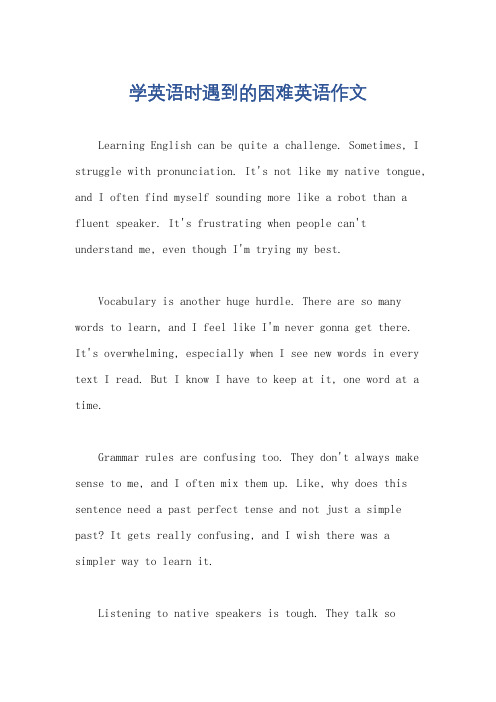
学英语时遇到的困难英语作文Learning English can be quite a challenge. Sometimes, I struggle with pronunciation. It's not like my native tongue, and I often find myself sounding more like a robot than a fluent speaker. It's frustrating when people can't understand me, even though I'm trying my best.Vocabulary is another huge hurdle. There are so many words to learn, and I feel like I'm never gonna get there.It's overwhelming, especially when I see new words in every text I read. But I know I have to keep at it, one word at a time.Grammar rules are confusing too. They don't always make sense to me, and I often mix them up. Like, why does this sentence need a past perfect tense and not just a simple past? It gets really confusing, and I wish there was a simpler way to learn it.Listening to native speakers is tough. They talk sofast, and sometimes I can't catch what they're saying. It feels like they're speaking in a whole different language! But I know it's just a matter of practice, so I keep listening and trying to understand.And let's not forget about cultural differences.。
学英语的困难英语作文
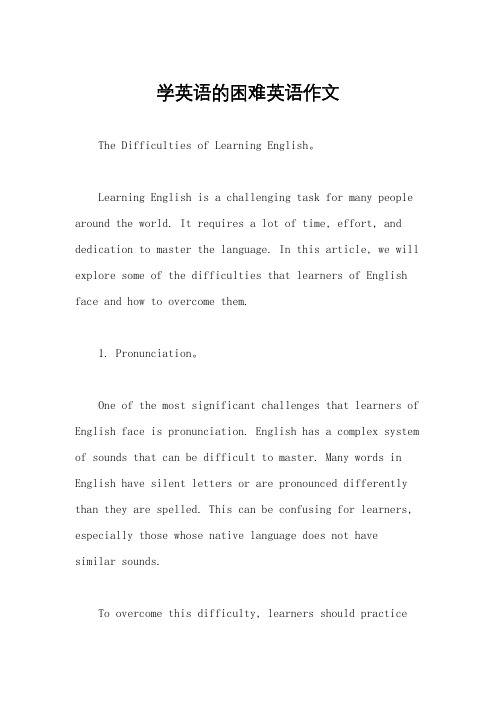
学英语的困难英语作文The Difficulties of Learning English。
Learning English is a challenging task for many people around the world. It requires a lot of time, effort, and dedication to master the language. In this article, we will explore some of the difficulties that learners of English face and how to overcome them.1. Pronunciation。
One of the most significant challenges that learners of English face is pronunciation. English has a complex system of sounds that can be difficult to master. Many words in English have silent letters or are pronounced differently than they are spelled. This can be confusing for learners, especially those whose native language does not havesimilar sounds.To overcome this difficulty, learners should practicetheir pronunciation regularly. They can listen to native speakers and try to imitate their pronunciation. They can also use online resources or hire a tutor to help them improve their pronunciation.2. Grammar。
在学英语的过程中遇到的问题的作文
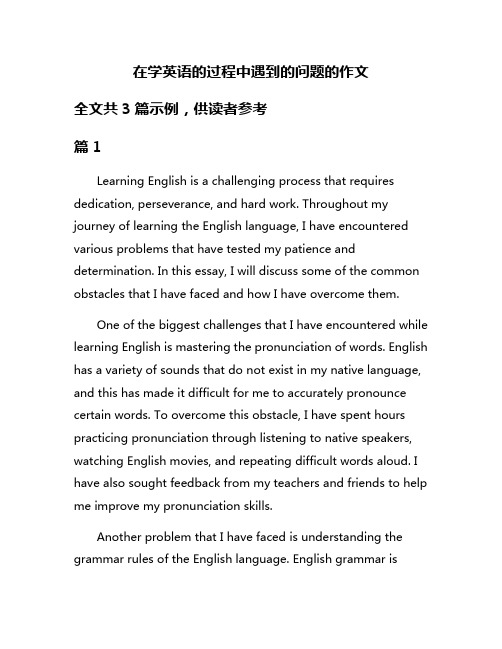
在学英语的过程中遇到的问题的作文全文共3篇示例,供读者参考篇1Learning English is a challenging process that requires dedication, perseverance, and hard work. Throughout my journey of learning the English language, I have encountered various problems that have tested my patience and determination. In this essay, I will discuss some of the common obstacles that I have faced and how I have overcome them.One of the biggest challenges that I have encountered while learning English is mastering the pronunciation of words. English has a variety of sounds that do not exist in my native language, and this has made it difficult for me to accurately pronounce certain words. To overcome this obstacle, I have spent hours practicing pronunciation through listening to native speakers, watching English movies, and repeating difficult words aloud. I have also sought feedback from my teachers and friends to help me improve my pronunciation skills.Another problem that I have faced is understanding the grammar rules of the English language. English grammar iscomplex and can be confusing, especially for non-native speakers. I have struggled with understanding the different tenses, sentence structures, and word order in English. To address this issue, I have invested time in studying grammar books, doing grammar exercises, and seeking help from my teachers. I have also tried to immerse myself in English-speaking environments to practice using grammar in real-life situations.Vocabulary has also been a challenge for me. English has a vast vocabulary with many words that have different meanings and nuances. Learning and retaining new words has been a struggle for me, as it can be overwhelming to memorize them all. To improve my vocabulary, I have created flashcards, used vocabulary apps, and read English books and articles regularly. I have also applied the words I have learned in writing and speaking practice to reinforce my memory.Additionally, cultural differences have presented a barrier in my English language learning journey. English is not just a language; it is also deeply intertwined with the culture and customs of English-speaking countries. Understanding cultural references, idioms, and expressions has been a challenge for me, as they can be difficult to interpret without prior knowledge of the culture. To address this issue, I have researchedEnglish-speaking cultures, watched documentaries, and interacted with native speakers to gain insight into their way of life.In conclusion, learning English has been a rewarding yet challenging experience for me. Despite the obstacles I have faced, I have persevered and made progress in my language skills. By tackling pronunciation, grammar, vocabulary, and cultural differences, I have been able to improve my English language proficiency and become more confident in using the language. I believe that with determination, dedication, and continuous practice, anyone can overcome the difficulties of learning English and achieve fluency in the language.篇2Learning English can be a challenging yet rewarding journey for many people. As a second language learner, I have encountered various difficulties and obstacles in my process of learning English. In this essay, I will discuss some of the common problems I have faced and how I have overcome them.One of the biggest challenges for me in learning English is pronunciation. English pronunciation can be quite tricky, with its many different sounds and rules. As a non-native speaker, I oftenstruggle with pronouncing certain words correctly, which can make it difficult for others to understand me. To improve my pronunciation, I have been practicing regularly by listening to native speakers, repeating after them, and recording myself to compare my pronunciation with theirs. I have also been working on my intonation and stress patterns to sound more natural when speaking English.Another issue I have encountered is vocabulary. English has a vast vocabulary with many words that have similar meanings but are used in different contexts. This can be confusing for language learners like me. To expand my vocabulary, I have been reading English books, watching movies and TV shows, and using vocabulary-building apps. I have also been keeping a vocabulary journal where I write down new words I come across and their meanings, and I review them regularly to reinforce my memory.Grammar is another area where I have faced challenges. English grammar rules can be complex and sometimes inconsistent. I have struggled with using the correct tenses, prepositions, and articles in my sentences. To improve my grammar, I have been studying grammar books, doing grammar exercises, and seeking feedback from teachers and nativespeakers. I have also been practicing writing essays and sentences to apply what I have learned and identify any errors that I make.One of the difficulties I have faced in learning English is speaking fluently. I often find myself hesitating or struggling to find the right words when speaking in English. To improve my fluency, I have been practicing speaking with native speakers, participating in conversations and group discussions, and giving presentations in English. I have also been working on my listening skills by watching TED Talks, podcasts, and news programs in English to expose myself to different accents and speech patterns.In conclusion, learning English is a challenging but rewarding process. Despite the difficulties and obstacles I have faced, I have made progress in my language skills by addressing these problems proactively. By focusing on pronunciation, vocabulary, grammar, and fluency, I have been able to improve my English proficiency and become more confident in using the language. I believe that with dedication, perseverance, and continuous practice, anyone can overcome the challenges of learning English and achieve fluency in the language.篇3Learning English is a challenging and rewarding process. However, it is not without its obstacles. Throughout my journey of studying English, I have encountered several common problems that many learners face. In this essay, I will discuss these challenges and provide some possible solutions to overcome them.One of the most common problems I have faced while learning English is pronunciation. English pronunciation can be quite tricky due to the numerous irregularities and exceptions in the language. As a non-native speaker, it can be difficult to master the correct pronunciation of words. To overcome this challenge, I have found that practicing with native speakers and listening to English songs and podcasts can be helpful. Mimicking the pronunciation of native speakers and paying attention to the intonation and stress of words can also aid in improving pronunciation skills.Another issue I have encountered is vocabulary retention. English has a vast vocabulary with a wide range of words and phrases. It can be overwhelming to remember all of these words, especially when studying a new language. To address this problem, I have started using flashcards and vocabulary apps to help me memorize new words. Additionally, reading Englishbooks, watching English movies, and listening to English music have also helped me expand my vocabulary and improve my language skills.Grammar is another challenge that many English learners face. English grammar rules can be complex and confusing, making it challenging to use them correctly in sentences. To improve my grammar skills, I have been studying grammar books, taking grammar quizzes online, and practicing writing essays and paragraphs. Seeking feedback from teachers or native speakers on my writing can also assist in identifying and correcting grammar mistakes.Moreover, speaking fluently in English can be a struggle for beginners. It can be intimidating to engage in conversations with native speakers or to participate in English-speaking activities. To build confidence in speaking, I have been practicing speaking with friends or language partners, joining English conversation clubs, and participating in language exchange programs online. By actively engaging in conversations and speaking practice, I have noticed a significant improvement in my fluency and conversational skills.Lastly, motivation and consistency are crucial factors in language learning. It can be easy to lose motivation or becomediscouraged when facing challenges in learning English. To stay motivated, I remind myself of the reasons why I am learning English and set achievable goals for myself. Breaking down the learning process into smaller tasks and celebrating small victories along the way can help maintain motivation and momentum in language learning.In conclusion, learning English is a journey filled with obstacles and challenges. However, with dedication, perseverance, and the right strategies, these problems can be overcome. By addressing pronunciation, vocabulary retention, grammar, speaking fluency, and motivation, I have been able to make progress in my English language skills. As I continue on this journey, I am committed to facing these challenges head-on and striving to become fluent in English.。
学英语时遇到的困难英语作文
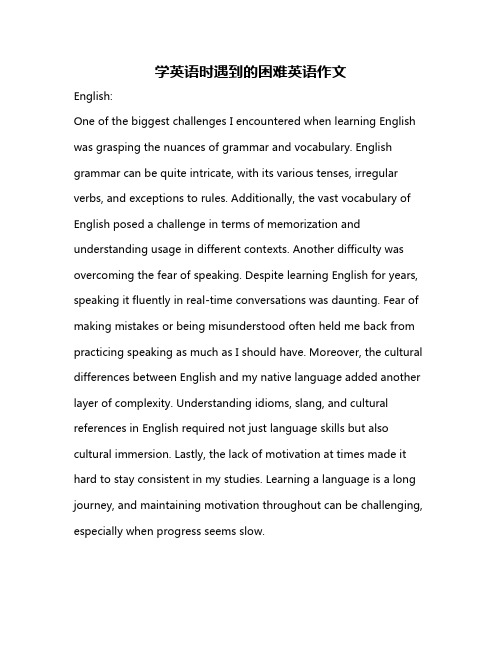
学英语时遇到的困难英语作文English:One of the biggest challenges I encountered when learning English was grasping the nuances of grammar and vocabulary. English grammar can be quite intricate, with its various tenses, irregular verbs, and exceptions to rules. Additionally, the vast vocabulary of English posed a challenge in terms of memorization and understanding usage in different contexts. Another difficulty was overcoming the fear of speaking. Despite learning English for years, speaking it fluently in real-time conversations was daunting. Fear of making mistakes or being misunderstood often held me back from practicing speaking as much as I should have. Moreover, the cultural differences between English and my native language added another layer of complexity. Understanding idioms, slang, and cultural references in English required not just language skills but also cultural immersion. Lastly, the lack of motivation at times made it hard to stay consistent in my studies. Learning a language is a long journey, and maintaining motivation throughout can be challenging, especially when progress seems slow.中文翻译:学习英语时遇到的最大挑战之一是掌握语法和词汇的微妙之处。
学英语遇到的困难和解决办法英语作文60字
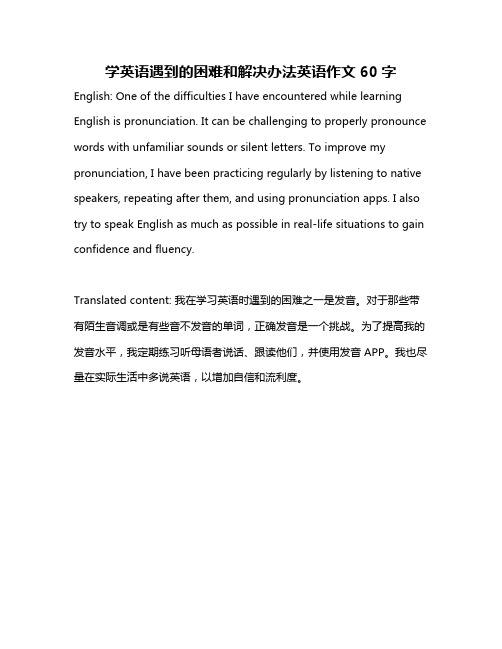
学英语遇到的困难和解决办法英语作文60字English: One of the difficulties I have encountered while learning English is pronunciation. It can be challenging to properly pronounce words with unfamiliar sounds or silent letters. To improve my pronunciation, I have been practicing regularly by listening to native speakers, repeating after them, and using pronunciation apps. I also try to speak English as much as possible in real-life situations to gain confidence and fluency.
Translated content: 我在学习英语时遇到的困难之一是发音。
对于那些带有陌生音调或是有些音不发音的单词,正确发音是一个挑战。
为了提高我的发音水平,我定期练习听母语者说话、跟读他们,并使用发音APP。
我也尽量在实际生活中多说英语,以增加自信和流利度。
学英语困难的英语作文初三
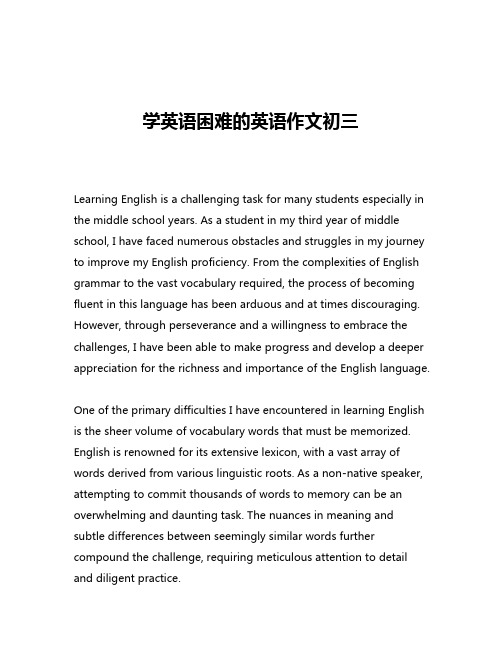
学英语困难的英语作文初三Learning English is a challenging task for many students especially in the middle school years. As a student in my third year of middle school, I have faced numerous obstacles and struggles in my journey to improve my English proficiency. From the complexities of English grammar to the vast vocabulary required, the process of becoming fluent in this language has been arduous and at times discouraging. However, through perseverance and a willingness to embrace the challenges, I have been able to make progress and develop a deeper appreciation for the richness and importance of the English language.One of the primary difficulties I have encountered in learning English is the sheer volume of vocabulary words that must be memorized. English is renowned for its extensive lexicon, with a vast array of words derived from various linguistic roots. As a non-native speaker, attempting to commit thousands of words to memory can be an overwhelming and daunting task. The nuances in meaning and subtle differences between seemingly similar words further compound the challenge, requiring meticulous attention to detail and diligent practice.In addition to the expansive vocabulary, the complex grammar structures of the English language have proven to be a significant obstacle. The rules governing verb tenses, sentence structure, and grammatical agreements can be convoluted and inconsistent, making it difficult to develop a solid understanding of proper usage. Navigating the exceptions to these rules and the irregular patterns that exist within the language can be particularly frustrating, as it requires a deep level of comprehension and constant reinforcement.Furthermore, the pronunciation of English words presents its own set of challenges. The inconsistent relationship between the written form of a word and its spoken counterpart can be confusing and lead to mispronunciation. The presence of silent letters, diphthongs, and unique vowel sounds adds an additional layer of complexity that must be mastered. Achieving accurate pronunciation is crucial not only for effective communication but also for developing a more natural and fluid command of the language.Another significant hurdle in my journey to learn English has been the lack of opportunities to practice the language outside of the classroom. While English is widely taught in schools, the majority of my interactions and daily communication still occur in my native language. This limited exposure to authentic English usage can make it challenging to develop a natural fluency and comfort with thelanguage. Without regular practice, it becomes difficult to internalize the nuances of the language and apply them seamlessly in real-world situations.Moreover, the cultural and contextual differences inherent in the English language can pose additional barriers to effective communication. Idioms, colloquialisms, and cultural references that are second nature to native speakers can be perplexing and difficult to comprehend for non-native learners. Understanding the underlying cultural context and the intended meaning behind these linguistic elements requires a deep immersion in the language and a familiarity with the customs and traditions of English-speaking societies.Despite these formidable challenges, I remain determined to overcome the obstacles and continue my pursuit of English proficiency. I have adopted various strategies and techniques to enhance my learning experience and improve my skills. Consistent practice, both in and out of the classroom, has been instrumental in reinforcing the concepts I have learned and building a stronger foundation in the language. Engaging with English-language media, such as movies, books, and music, has also proven to be a valuable tool in expanding my vocabulary and familiarizing myself with authentic usage.Furthermore, I have sought out opportunities to engage in conversation with native English speakers, whether through language exchange programs, online forums, or interactions with English-speaking peers. These interactions have not only helped me to improve my conversational skills but have also provided invaluable insights into the nuances of the language and the cultural contexts that shape its usage.Additionally, I have embraced the use of language-learning apps, online resources, and educational tools to supplement my classroom learning. These digital tools offer a wide range of exercises, quizzes, and interactive activities that cater to different learning styles and help me to identify and address my specific weaknesses.Throughout this journey, I have also learned to be patient and kind to myself, acknowledging that progress in language learning is a gradual process that requires time, dedication, and a willingness to make mistakes. I have learned to celebrate small victories and to view setbacks as opportunities for growth and improvement, rather than as failures.In conclusion, the challenges of learning English as a middle school student are numerous and multifaceted. From the vastness of the vocabulary to the complexities of grammar and pronunciation, the obstacles can seem daunting and overwhelming. However, through acombination of perseverance, strategic learning techniques, and a positive mindset, I have been able to make steady progress and develop a deeper appreciation for the richness and importance of the English language. As I continue on this journey, I am confident that with continued effort and a willingness to embrace the challenges, I will be able to overcome the difficulties and achieve a level of proficiency that will serve me well in my academic and professional pursuits.。
学习英语遇到的困难英语作文
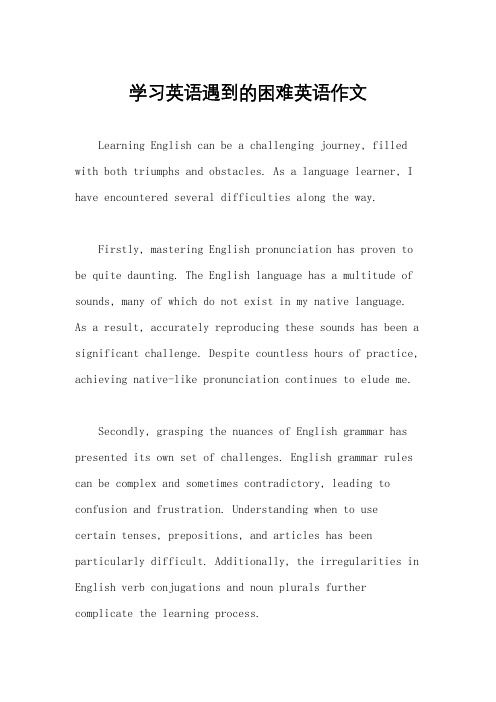
学习英语遇到的困难英语作文Learning English can be a challenging journey, filled with both triumphs and obstacles. As a language learner, I have encountered several difficulties along the way.Firstly, mastering English pronunciation has proven to be quite daunting. The English language has a multitude of sounds, many of which do not exist in my native language. As a result, accurately reproducing these sounds has been a significant challenge. Despite countless hours of practice, achieving native-like pronunciation continues to elude me.Secondly, grasping the nuances of English grammar has presented its own set of challenges. English grammar rules can be complex and sometimes contradictory, leading to confusion and frustration. Understanding when to usecertain tenses, prepositions, and articles has been particularly difficult. Additionally, the irregularities in English verb conjugations and noun plurals further complicate the learning process.Another obstacle I have faced is expanding my vocabulary. English boasts an extensive lexicon, with countless words and phrases to learn. Memorizing new vocabulary words is time-consuming, and retaining them requires regular practice and exposure. Furthermore, understanding the subtle differences in meaning between similar words can be challenging, especially when context is limited.Moreover, overcoming the fear of making mistakes has been a constant struggle. Communicating in a second language inevitably involves errors, yet the fear of embarrassment or misunderstanding can hinder progress. Overcoming this fear and embracing mistakes as opportunities for learning is essential for language acquisition.Furthermore, cultural differences present additional hurdles in language learning. English is not only a language but also a gateway to understanding Anglophone cultures. Navigating cultural nuances, idioms, andexpressions adds another layer of complexity to the learning process. Without a deep understanding of cultural context, comprehension and communication can besignificantly impaired.In addition, finding opportunities for immersive language practice can be challenging, especially in non-English-speaking environments. While textbooks and language-learning apps are valuable resources, real-world interaction is crucial for honing language skills. However, opportunities for meaningful conversation in English may be limited, making it difficult to practice speaking and listening skills.Despite these challenges, I remain committed to improving my English proficiency. Patience, perseverance, and dedication are key to overcoming obstacles and achieving fluency. By actively seeking out opportunitiesfor practice, embracing mistakes as learning opportunities, and continuously expanding my language skills, I am confident that I will overcome these challenges and become a proficient English speaker.。
英语作文写学习英语的困难
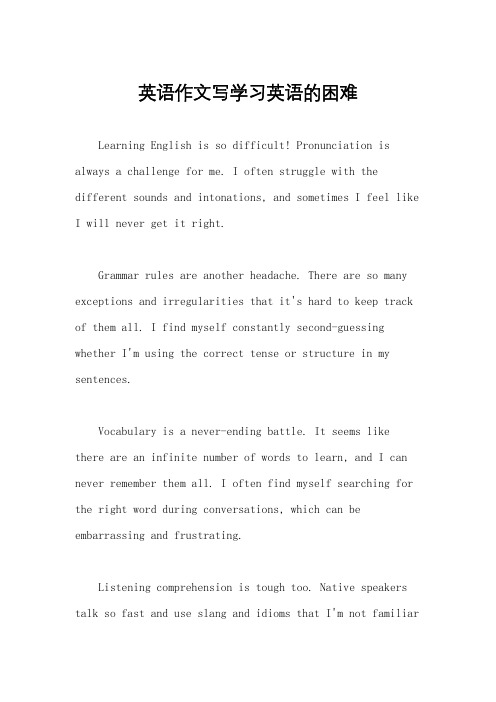
英语作文写学习英语的困难Learning English is so difficult! Pronunciation is always a challenge for me. I often struggle with the different sounds and intonations, and sometimes I feel like I will never get it right.Grammar rules are another headache. There are so many exceptions and irregularities that it's hard to keep track of them all. I find myself constantly second-guessing whether I'm using the correct tense or structure in my sentences.Vocabulary is a never-ending battle. It seems like there are an infinite number of words to learn, and I can never remember them all. I often find myself searching for the right word during conversations, which can be embarrassing and frustrating.Listening comprehension is tough too. Native speakers talk so fast and use slang and idioms that I'm not familiarwith. It's hard to keep up and understand everythingthey're saying, especially in real-life situations where there are no subtitles to help me out.Writing in English is a whole other challenge. I struggle with organizing my thoughts and expressing myself clearly and concisely. It's difficult to convey my ideas effectively in a language that is not my own.Overall, learning English is a constant struggle. It requires patience, perseverance, and a lot of practice. Despite the difficulties, I know that improving my English skills will open up so many opportunities for me in the future.。
用英语写学英语的困难作文
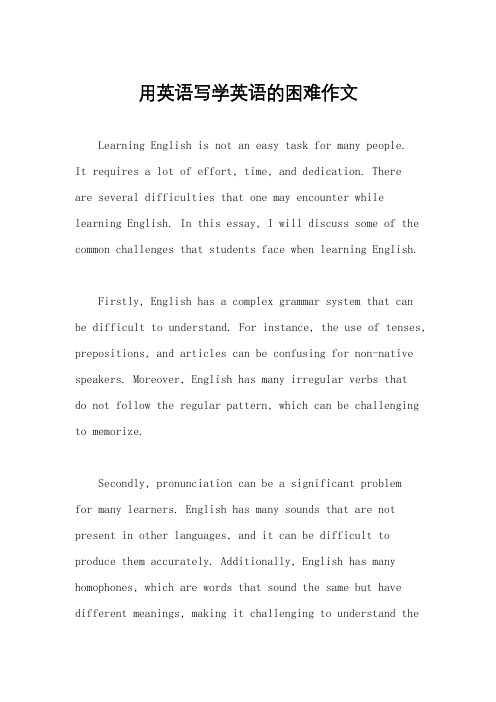
用英语写学英语的困难作文Learning English is not an easy task for many people.It requires a lot of effort, time, and dedication. Thereare several difficulties that one may encounter while learning English. In this essay, I will discuss some of the common challenges that students face when learning English.Firstly, English has a complex grammar system that can be difficult to understand. For instance, the use of tenses, prepositions, and articles can be confusing for non-native speakers. Moreover, English has many irregular verbs thatdo not follow the regular pattern, which can be challenging to memorize.Secondly, pronunciation can be a significant problemfor many learners. English has many sounds that are not present in other languages, and it can be difficult to produce them accurately. Additionally, English has many homophones, which are words that sound the same but have different meanings, making it challenging to understand themeaning of a sentence.Thirdly, vocabulary can be a significant hurdle for many learners. English has a vast vocabulary, and it can be overwhelming to memorize all the words. Moreover, manywords have multiple meanings, which can be confusing.Fourthly, the cultural differences between the English-speaking countries and the learners' countries can also bea challenge. For example, idioms and slang expressions can be difficult to understand, as they are often used in informal situations and may not have a direct translation.Finally, lack of practice and exposure to the language can hinder the learning process. English is a language that requires consistent practice to master. Without regular practice, learners may forget what they have learned, and their progress may be slow.In conclusion, learning English is not an easy task,and learners may encounter several challenges along the way. However, with dedication, effort, and practice, it ispossible to overcome these difficulties and become proficient in English.。
遇到的困难的英语作文
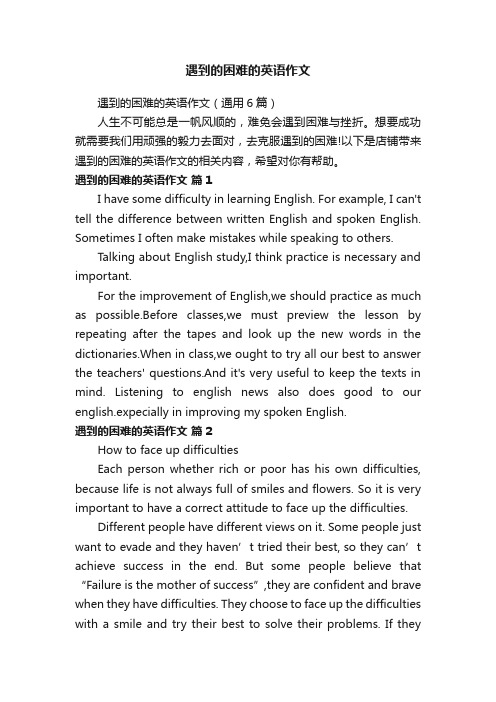
遇到的困难的英语作文遇到的困难的英语作文(通用6篇)人生不可能总是一帆风顺的,难免会遇到困难与挫折。
想要成功就需要我们用顽强的毅力去面对,去克服遇到的困难!以下是店铺带来遇到的困难的英语作文的相关内容,希望对你有帮助。
遇到的困难的英语作文篇1I have some difficulty in learning English. For example, I can't tell the difference between written English and spoken English. Sometimes I often make mistakes while speaking to others.Talking about English study,I think practice is necessary and important.For the improvement of English,we should practice as much as possible.Before classes,we must preview the lesson by repeating after the tapes and look up the new words in the dictionaries.When in class,we ought to try all our best to answer the teachers' questions.And it's very useful to keep the texts in mind. Listening to english news also does good to our english.expecially in improving my spoken English.遇到的困难的英语作文篇2How to face up difficultiesEach person whether rich or poor has his own difficulties, because life is not always full of smiles and flowers. So it is very important to have a correct attitude to face up the difficulties.Different people have different views on it. Some people just want to evade and they haven’t tried their best, so they can’t achieve success in the end. But some people believe that “Failure is the mother of success”,they are confident and brave when they have difficulties. They choose to face up the difficulties with a smile and try their best to solve their problems. If theyhave troubles they’ll discuss with their friends or family members.The right way to face up difficulties is to be confident and brave , Confront difficulties with confident and you will find the difficulties are not so hard as you thought. Try to solve the difficulties with brave and work hard , the difficulties will disappear and you will achieve success finally.怎样面对困难无论贫穷或是富有每个人都会遇到困难,因为生命中不全是微笑和花朵。
简写150个字学习英语中遇到的困难作文
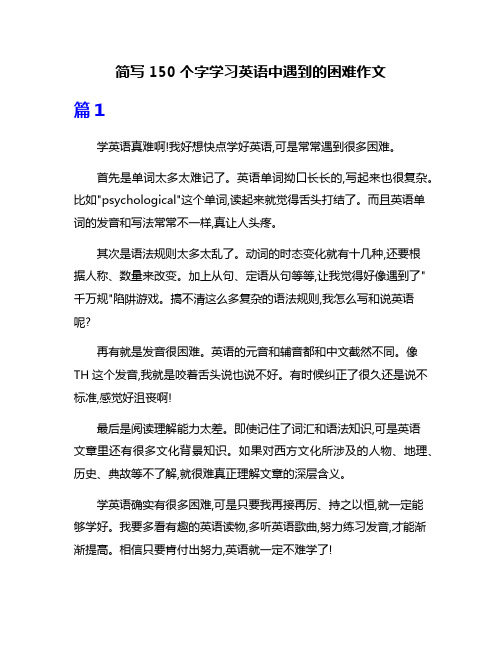
简写150个字学习英语中遇到的困难作文篇1学英语真难啊!我好想快点学好英语,可是常常遇到很多困难。
首先是单词太多太难记了。
英语单词拗口长长的,写起来也很复杂。
比如"psychological"这个单词,读起来就觉得舌头打结了。
而且英语单词的发音和写法常常不一样,真让人头疼。
其次是语法规则太多太乱了。
动词的时态变化就有十几种,还要根据人称、数量来改变。
加上从句、定语从句等等,让我觉得好像遇到了"千万规"陷阱游戏。
搞不清这么多复杂的语法规则,我怎么写和说英语呢?再有就是发音很困难。
英语的元音和辅音都和中文截然不同。
像TH这个发音,我就是咬着舌头说也说不好。
有时候纠正了很久还是说不标准,感觉好沮丧啊!最后是阅读理解能力太差。
即使记住了词汇和语法知识,可是英语文章里还有很多文化背景知识。
如果对西方文化所涉及的人物、地理、历史、典故等不了解,就很难真正理解文章的深层含义。
学英语确实有很多困难,可是只要我再接再厉、持之以恒,就一定能够学好。
我要多看有趣的英语读物,多听英语歌曲,努力练习发音,才能渐渐提高。
相信只要肯付出努力,英语就一定不难学了!篇2学习英语真是太难了!我经常会遇到各种各样的困难。
比如有好多单词我总是记不住,老是会忘个精光。
再比如那些奇奇怪怪的语法规则,弄得我头昏脑胀的。
有时候我会对一些句子的意思感到很迷惑,弄不明白它到底想表达些什么。
英语发音也是个大问题。
有些音我怎么也发不标准,尽管老师一再纠正。
再加上英语里各种各样的俗语、成语和习语,简直让人晕头转向。
有时朋友们随口说了句俗语,我就完全傻眼了。
不过话虽这么说,我也清楚学好英语对将来是很有帮助的。
所以我并没有放弃,反而更加努力。
我买了挺多课外读物,有有声读物也有一般的书,看得我是孜孜不倦。
同时我也喜欢上网看一些英语视频和电影。
虽然理解起来有点吃力,但至少锻炼了我的听力。
有不明白的地方,我就及时问父母或老师。
介绍最近在学习上遇到的困难英语作文

介绍最近在学习上遇到的困难英语作文Recently, I have been facing some difficulties in learning English composition.最近我在学习英语作文方面遇到了一些困难。
One of the main challenges I have encountered is the struggle with expressing my ideas coherently and effectively in written form.我遇到的主要挑战之一是在书面形式中清晰、有效地表达我的观点。
I often find myself spending a significant amount of time brainstorming and organizing my thoughts before I even begin to write.在开始写作之前,我常常花费大量时间进行头脑风暴和整理思绪。
This process can be quite frustrating, as I often feel as though my ideas are scattered and disjointed, resulting in a lack of fluency in my writing.这个过程可能令人沮丧,因为我常常感到自己的想法零散、不连贯,在写作上缺乏流畅性。
Additionally, I struggle with finding the right words and phrases to convey my thoughts accurately and eloquently.另外,我在找到准确、雄辩地表达我的想法之时感到困难。
This often leads to a lot of backtracking and revising, which can be time-consuming and disheartening.这经常导致许多的反复修改,这会耗费时间、让人泄气。
有关学习英语困难的英语作文
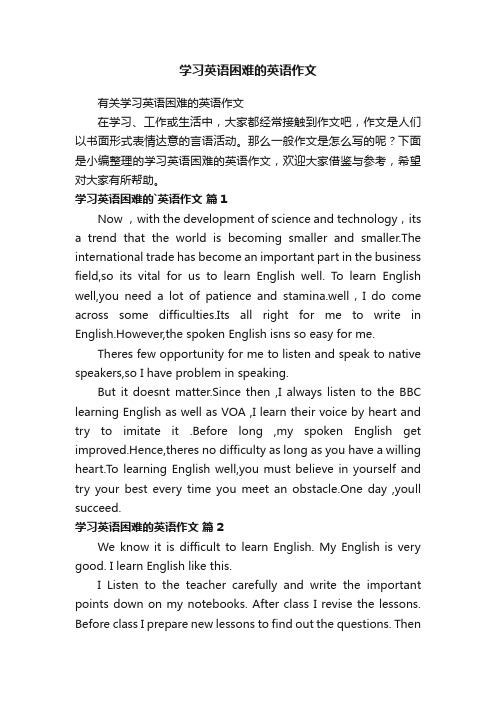
学习英语困难的英语作文有关学习英语困难的英语作文在学习、工作或生活中,大家都经常接触到作文吧,作文是人们以书面形式表情达意的言语活动。
那么一般作文是怎么写的呢?下面是小编整理的学习英语困难的英语作文,欢迎大家借鉴与参考,希望对大家有所帮助。
学习英语困难的`英语作文篇1Now ,with the development of science and technology,its a trend that the world is becoming smaller and smaller.The international trade has become an important part in the business field,so its vital for us to learn English well. To learn English well,you need a lot of patience and stamina.well,I do come across some difficulties.Its all right for me to write in English.However,the spoken English isns so easy for me.Theres few opportunity for me to listen and speak to native speakers,so I have problem in speaking.But it doesnt matter.Since then ,I always listen to the BBC learning English as well as VOA ,I learn their voice by heart and try to imitate it .Before long ,my spoken English get improved.Hence,theres no difficulty as long as you have a willing heart.T o learning English well,you must believe in yourself and try your best every time you meet an obstacle.One day ,youll succeed.学习英语困难的英语作文篇2We know it is difficult to learn English. My English is very good. I learn English like this.I Listen to the teacher carefully and write the important points down on my notebooks. After class I revise the lessons. Before class I prepare new lessons to find out the questions. ThenI will listen carefully in class.I also listen to the tape, and speak English with my classmates in the classroom and on the playground. Its to improve my listening and speaking.I keep a diary every day to practise my written English.Besides this, I often read English newspapers and magazines to enrich my knowlege on English culture.We will learn English well so long as we learn it hard.学习英语困难的英语作文篇3Most Chinese students have difficulties in learning English. The difficulties vary so much from person to person that it is difficult to cite here in a few words. Some may have problems in reading. Others may have trouble in writing. I also had problems in English learning, but my difficulty seemed to lie in listening. For example, when tested for listening comprehension, I couldnt understand a single sentence, let alone a passage of medium level.In order to overcome the difficulty in my English learning, I made great efforts to find the key to the problem. I consulted my teacher and found out that I merely didnt have enough time to practice listening. So I bought a tape recorder and listened to it at least two hours a day. In addition, I listened to "Special English" on VOA. I also went out of my way to speak to foreigners on the campus whenever we meet so that I could have the chance to listen to the native speakers. After half a years hard work, I could get 70% of the questions correct in listening comprehension tests.I own my success to my English teacher. It is him who tells me the correct way to learn English. It is him who always encourages me when I encounter difficulties and feel disappointed.。
- 1、下载文档前请自行甄别文档内容的完整性,平台不提供额外的编辑、内容补充、找答案等附加服务。
- 2、"仅部分预览"的文档,不可在线预览部分如存在完整性等问题,可反馈申请退款(可完整预览的文档不适用该条件!)。
- 3、如文档侵犯您的权益,请联系客服反馈,我们会尽快为您处理(人工客服工作时间:9:00-18:30)。
三年级作文:学英语遇到的困难
我相信大家在生活中有很多困难吧,今天,我来跟大家说说我在学英语是遇到的困难吧。
有一天,英语老师要检查英语单词。
开始检查了,轮到我的时候,别的单词都很好,可我却在读head(头)的时候却读成hand(手)了!老师指出了我读错的地方,还叫我多听录音。
我回到家,仔细观察。
结果发现,head中有一“e”,而hand却没有。
当时我以为这样就可以了,英语考试时,我就把head和hand给搞混了!试卷发下来之后,我仔细一看,原来,我把head的中文:头,当成了hand!而把hand的中文:手,当成了head,多粗心呀!最后,经过我每天听录音,我终于克服了这个困难。
啊!真是“世上无难事,只怕有心人”呀!经过这件事情,我终于明白了这句话的道理。
